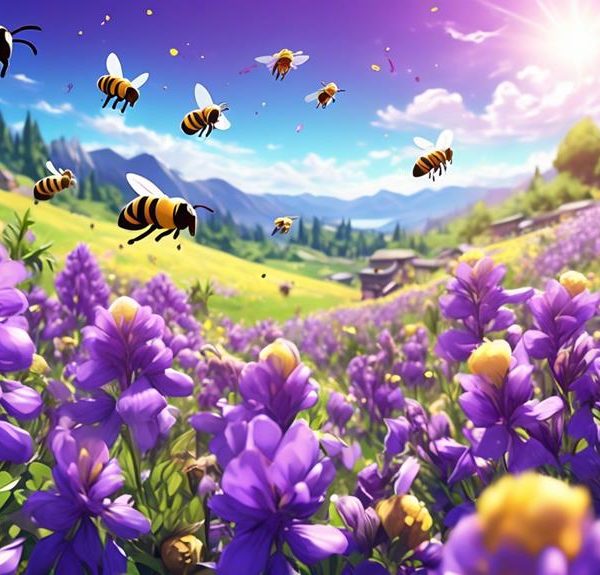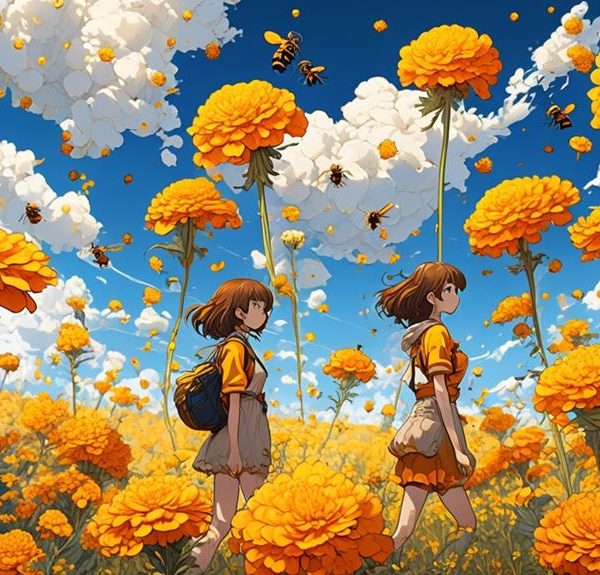Peek into the intriguing world of bees and their surprising preferences for African daisies; a tale that may inspire your gardening choices.
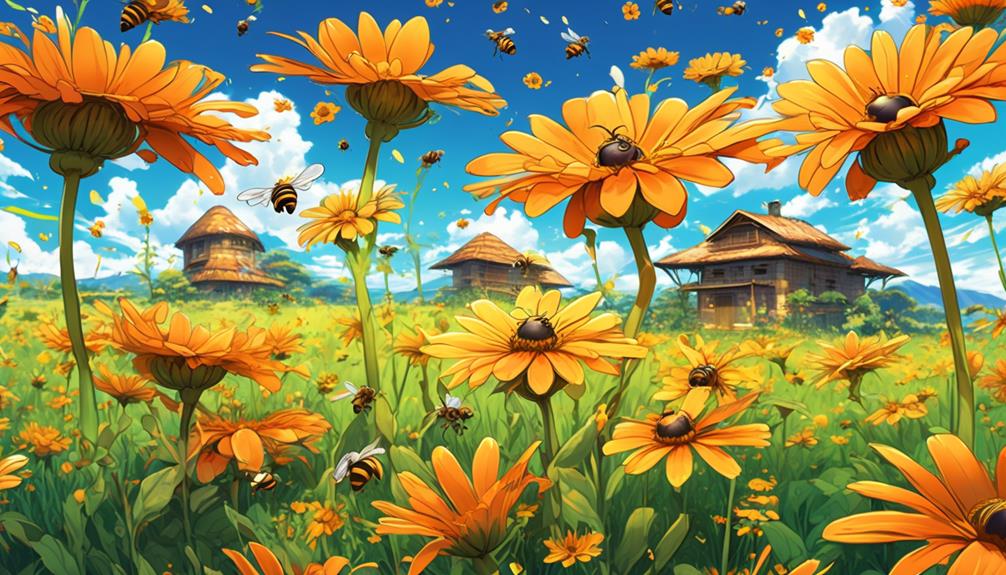
Do Bees Like African Daisies?
You might not know, but African daisies, with their radiant colors and robust growth, have been the subject of many ecological studies.
You're probably wondering, 'Why all this fuss over a flower?' Well, these vibrant blooms are part of a larger discussion on the relationship between flowers and pollinators, particularly bees.
As bees buzz from flower to flower, they play an indispensable role in our ecosystem. But do they have a preference when it comes to African daisies?
The answer might surprise you, and it could change the way you approach your own garden or flower arrangements.
Key Takeaways
- African daisies, scientifically known as Osteospermum, are attractive to bees due to their vibrant colors and sweet nectar.
- Bees play a crucial role in plant reproduction and the health of ecosystems, making them essential for maintaining biodiversity.
- Bees prefer flowers with bright colors like yellow and blue, a strong sweet fragrance, and a flat or shallow shape for easier nectar extraction.
- Planting African daisies and other bee-attracting flowers in a garden enhances biodiversity, attracts other beneficial species like birds, and reduces the need for chemical pesticides.
Understanding African Daisies
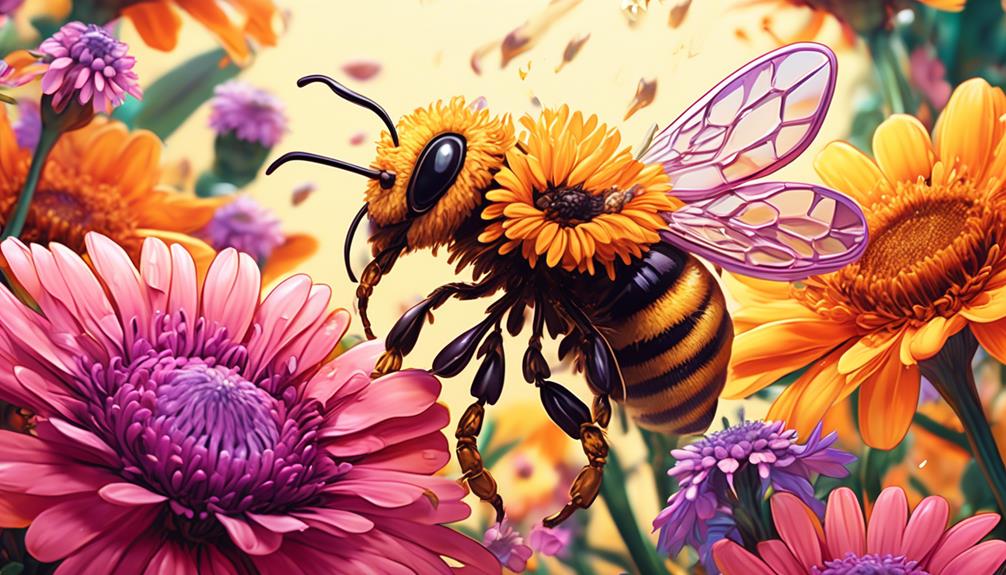
To truly appreciate the beauty of African daisies, you must delve into the intricate details of their botanic characteristics and understand their unique growth patterns. Scientifically known as Osteospermum, these stunning perennial plants hail from the sunflower family. They're native to South Africa, hence the name, and they've adapted to thrive in conditions that would wilt most other flowers.
You'll notice that African daisies aren't your typical flowers. Their vibrant petals, ranging from white and pink to purple and yellow, radiate from a dark blue or purple central disc, creating a captivating contrast. They typically bloom from spring to fall, offering a prolonged display of color that can brighten up any garden.
What's interesting about African daisies is their photo-tropic behavior. They're sun seekers. You'll see their blossoms open up at the first hint of sunlight, then close when dusk falls or during overcast conditions. This feature, coupled with their drought-resistant nature, makes them an ideal choice for sunny, arid regions.
In understanding African daisies, you'll also learn about their propagation methods. They're mainly propagated through cuttings or seeds, which you'll find handy if you plan to cultivate them. Remember, they're not just pretty; they're hardy, adaptable, and unique.
The Importance of Bees to Ecosystem
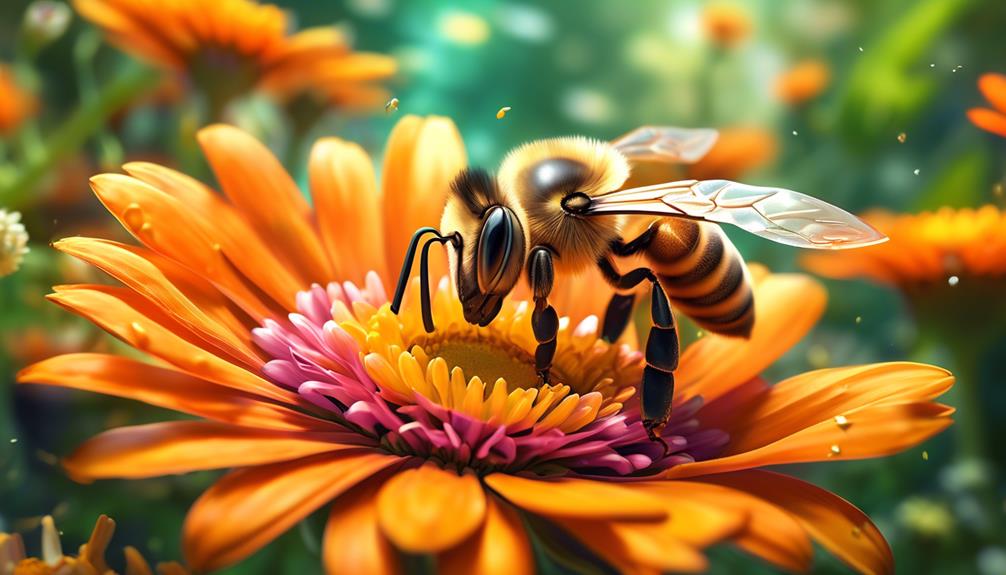
You mightn't realize it, but bees play a crucial role in maintaining the health and balance of our ecosystem. These tiny pollinators are the unsung heroes of our environment. They help in plant reproduction by transporting pollen from the male parts of a flower to the female parts. This pollination process is vital for the growth and development of plants, including the ones we rely on for food.
But it's not just about the food we eat. Bees also contribute to the diversity of plant life, which in turn provides habitats and food for a myriad of animal species. Without bees, these ecosystems would face serious disruption, potentially leading to the collapse of food chains.
Moreover, bees also have an economic role. Many agricultural businesses rely on bees for the pollination of commercial crops. Without them, these industries would face massive losses.
African Daisies and Bee Attraction
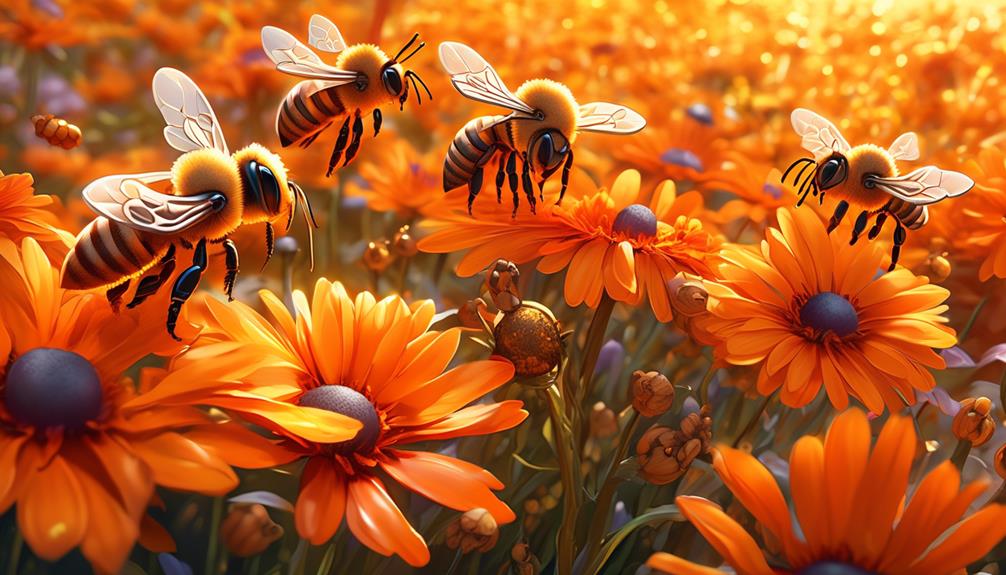
Interestingly, African Daisies are one of nature's most potent bee attractants, with their vibrant colors and sweet nectar acting like a magnet for these crucial pollinators. You'll often see bees buzzing around these plants, working tirelessly to collect nectar and pollen.
The African Daisy's vivid petals, often in tones of orange, yellow, or pink, are highly visible to bees. They're like bright signs saying, 'Hey, over here!' They're not just pretty to look at; these petals are also UV reflective, which is another feature that's attractive to bees.
Then there's the nectar. African Daisies produce an abundant supply, and the sweet taste is irresistible to bees. It's like their favorite restaurant that always delivers a five-star meal. But it's not just about the food. While bees are feasting on the nectar, they're also gathering pollen, which they'll carry to other flowers, aiding in pollination.
Factors Influencing Bees' Flower Preferences
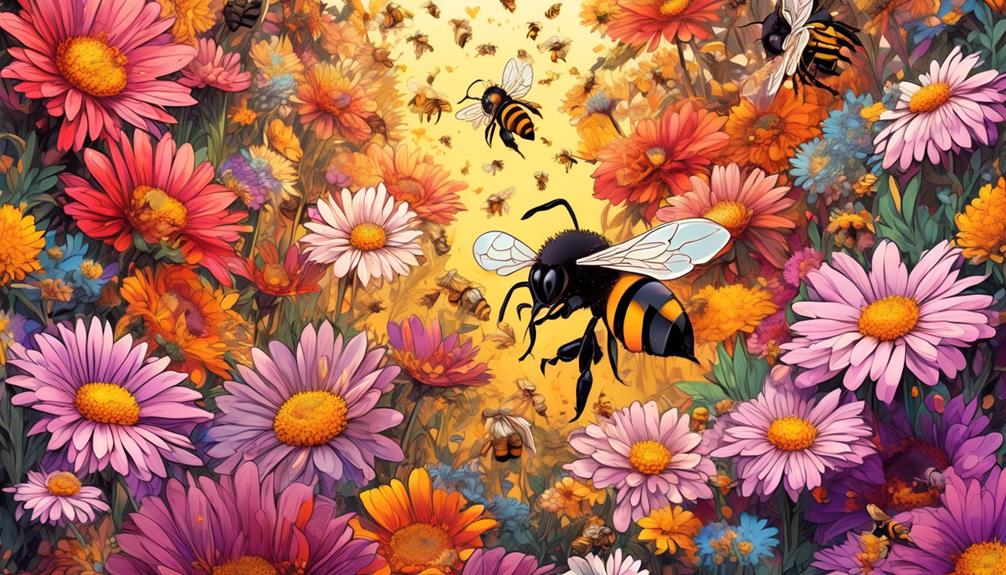
While African Daisies are indeed a favorite among bees, it's essential to understand the factors influencing these pollinators' flower preferences. As a beekeeper or a gardening enthusiast, it's crucial to grasp how diverse elements dictate which flowers bees are drawn to.
Color, scent, shape, and nectar availability are the key factors that bees consider when choosing their favorite flowers.
Color | Bees prefer bright and rich colors like yellow and blue. They can't see red, which they perceive as black. |
|---|---|
Scent | A strong sweet fragrance attracts bees. Flowers with a strong scent are more likely to lure bees. |
Shape | Bees prefer flowers with a flat or shallow shape as it's easier for them to extract nectar. |
Nectar | Flowers with a high nectar concentration are highly attractive to bees. |
Understanding these factors will help you choose the right flowers for your garden or apiary, attracting more bees and aiding in their survival. It's not just about African Daisies, but providing a variety of flowers that meet these criteria. Remember, your choices can significantly impact the local bee population, and in turn, our entire ecosystem.
Impact on Garden Biodiversity
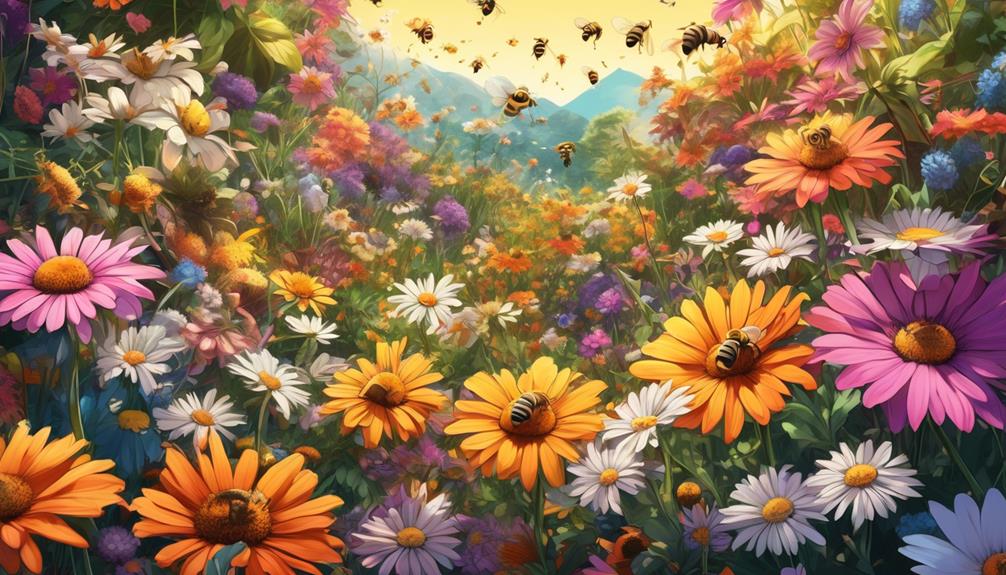
Planting a variety of bee-attracting flowers, such as African Daisies, can significantly enhance your garden's biodiversity, creating a thriving habitat for various beneficial insects and birds. These flowering plants not only add a touch of beauty to your outdoor space but also play a crucial role in the ecosystem.
African Daisies are a favorite among pollinators. They're rich in nectar and pollen, which are vital food sources for bees. The more bees you have visiting your garden, the more pollination occurs. This aids in the reproduction of plants, leading to a more diverse and robust garden ecosystem.
Birds are also attracted to gardens with a diverse range of plants and insects. They feed on insects, controlling their population, and in turn, they help spread seeds, further contributing to garden diversity.
Remember, a diverse garden isn't just visually appealing. It's healthier, too. Various insects, including bees and other pollinators, help control plant diseases and pests, reducing the need for chemical interventions.
Your decision to plant African Daisies and other bee-friendly flowers isn't just a gardening choice; it's a contribution to local biodiversity, and you're playing a part in maintaining the health of our ecosystems.
Creating a Bee-Friendly Garden
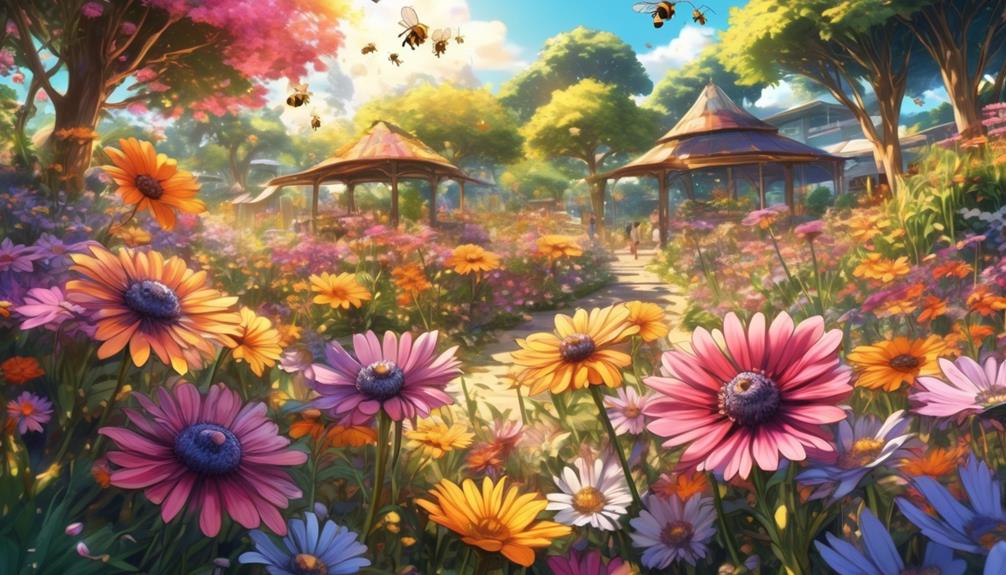
Taking the time to understand the importance of biodiversity, it's clear that your garden can serve as a crucial habitat for bees, and there are specific strategies you can adopt to make it even more inviting for these essential pollinators. You're not just creating a visually appealing space, but a functional and life-sustaining haven for bees.
First, diversify your plant selection. Bees are attracted to a variety of flowers, including African daisies. They're particularly drawn to blue, purple, white, and yellow flowers. Planting these in clusters makes it easier for bees to locate and collect pollen.
Second, keep a fresh water source available. Just like us, bees need water to survive. A shallow bird bath with a few stones for landing spots will do.
Third, avoid the use of pesticides. These chemicals can be lethal to bees and other beneficial insects. If pests become a problem, look for organic solutions.
Lastly, provide nesting sites. About 70% of bee species nest underground, while others prefer hollow stems or bare wood. Leaving a small patch of bare soil or a pile of twigs can provide suitable nesting options.
Creating a bee-friendly garden isn't only beneficial for the bees but also for your garden's overall health and productivity.
Frequently Asked Questions
What Are Some Other Flowers, Apart From African Daisies, That Bees Are Attracted To?
You're curious about flowers that attract bees, apart from African daisies. Well, bees are drawn to a variety of flowers. Some of their favorites include lavender, borage, and sunflowers.
Bees also love poppies, cosmos, and marigolds. These flowers are rich in nectar and pollen, which are essential food sources for bees.
How Can One Differentiate Between Different Bee Species?
You can differentiate between bee species by observing their physical characteristics. Look at their size, color patterns, and the presence or absence of hair.
Some bees, like the honeybee, are more robust and furry, while others, like the wasp-like bees, are more slender and less hairy.
Also, observe their behavior. Some species are solitary, while others live in colonies.
Don't forget, it's best to do this with a good field guide!
Are There Any Negative Impacts of Having Bees in Your Garden?
While you might worry about bee stings, having bees in your garden generally doesn't have negative impacts. On the contrary, they're beneficial. Bees pollinate flowers, enabling plant reproduction and enhancing your garden's biodiversity.
They help produce fruits and vegetables, contributing to your garden's productivity. Just ensure you're not allergic to bee stings and teach children to respect these busy workers.
What Factors Could Potentially Harm Bees in a Garden Environment?
Yes, bees do like African daisies. These flowers are a great source of nectar and pollen, which bees need for survival.
The bright colors and sweet scent of African daisies attract bees, making them an excellent choice if you're looking to create a bee-friendly garden.
However, be sure to also provide a water source and refrain from using harmful pesticides, as these can negatively impact the bee population.
Can Bees Help in the Growth of Other Plants Apart From African Daisies?
Absolutely, bees can help in the growth of many other plants besides African daisies. They're vital pollinators, transferring pollen from one plant to another, facilitating fertilization. This process is crucial for the reproduction of many plants.
Conclusion
In conclusion, bees undoubtedly adore African daisies. Their vibrant colors and sweet nectar make them an irresistible choice for these hardworking pollinators. However, various factors like flower type, color, and availability also influence their preferences.
Enhancing your garden with these daisies not only attracts more bees, but also boosts garden biodiversity. So, why not make your garden a bee haven by planting some captivating African daisies? They're a win-win for your garden's aesthetics and ecosystem health.

